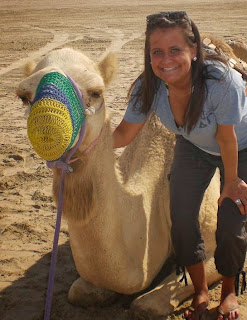In the American Midwest tree branches are bare. Brown leaves litter streets and sidewalks, frost fogs windows. Crisp blades of frozen grass stand at attention. Breath puffs into the chilly air like clouds.
winter in the American Midwest
We start out on the couch, but end up cross-legged on the soft, carpeted floor. Books and notebooks whirlpool around us. "Do you want tea or coffee?" she says.
No, thank you, I say.
She shrugs. Okay.
A 6-foot wide tapestry from Kuwait adds a bright bit of color to the cozy earth tone space. There's a dining room table, piles of books. A cheerful, functional kitchen. A bathroom with a spray nozzle built into the toilet seat. With a dial to select level of water pressure and a button to initiate stream.
example of portable bidet
We laugh about it, this bit of Middle Eastern preference tucked into America's heartland. "It's cool and refreshing," she agrees. Her smile is bright. "But then you're wet."
She has a Ph.D. in law and taught university before moving from the Middle East to Kansas. Where she takes the kids to school, meets up with friends at Starbucks, cleans house, cooks dinner. She's fun, funny, comfortable and smart and she wears a colorful, friendly hijab. She's my colloquial Egyptian Arabic tutor.
harakat! I say. In written Arabic the word means movement and refers to those little dots and dashes that appear above and below the looping Arabic letters. In colloquial Qatari dialect it's how a teen might say cool! or awesome!
She laughs. "In Egyptian dialect you could say gamda aowee." Which translates to rigid a lot.
da soura gamda aowee
not rigid in Cairo, 1974
All Arabs read and write using the same letters. Written Arabic has grammar rules, tenses, form, structure and is called fusha (fooS-Ha). It is the language of the Koran, and considered the foundation from which all Arabic dialect is derived.
Perhaps you, too, can read and write Arabic. Perhaps there is opportunity to use what you've learned on the street and in alleyways. Where educated Arabs recognize the high form of their language, chuckle at your stilted speech and respond slowly and carefully (because you're obviously not a native speaker). Perhaps communication happens.
But not cultural appreciation, personal comprehension, empathy.
shiny flask
Empathy is what happens in Qatar's silver and mirror lined window-less majlis spaces far from the English speaking streets. Where hidden women insist, just as it was in Egypt 30 years ago, a guest must eat three sugary dates as is stated in the Koran. To be a good guest here one must sip both tea and coffee, nibble cheesy bread and cake. Language flows fast, like the women who sit close, hover and fuss. It seems there are rules for everything from greeting one another to seating assignments, touching and laughing.
As in fusha, guttural 'ein is pronounced deep in the throat and "khaaf" spits like a hissing cat. But "jeem," a letter which says its name in fusha, is pronounced "ya" and the letter "qaaf" sounds like "g" as in "gate." Here "ee" means "yes" and "abee" means "I want."
Qatar's dialect, like its society, attempts to remain close to Koranic fusha. Both are ordered, structured. And changing.
Egyptian children's stage show
performed at Doha's souk waqif, 2012
Egyptian dialect, on the other hand, is loose, easy, indulgent, fun. Words flow, structure transforms to suit the moment, sound bits mix, muddle and sing. Egyptian dialect is the language of colloquial Arabic tv, music, books. Cartoons, comic books, children's programming is often produced using Egyptian dialect too. In Egypt, unlike Qatar, people speak their own language in the shops, markets, businesses and on the street.
Here, "ah" or a close lipped "mmm" translates to "yes." It's perfectly polite to add "ya" to the front of a person's name in greeting and everyone is "habibi/habibti" (my sweet one). In Egyptian dialect, "jeem" is expressed as "g" in "gate" while "qaaf" is eliminated altogether. There are words like "bass," "kidda," and "mish" which pepper speech like "yeah" and "uh huh" in English and "aiza" means "I want."
Sure, there are rules and structure, but rules are meant to be broken, right? The language, like the people, is vibrant, relaxed, comfortable, forgiving.
And changing. Like Egyptian society, which has experienced much turmoil in recent years - I am told there is a movement in Egypt to return the language of the street…to fusha.
returning soon to Cairo?

























